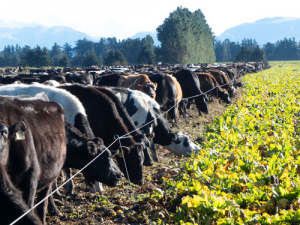Upper North Island Storms: Limited impact on dairy farms
For the most part, dairy farmers in the Waikato, Bay of Plenty, Tairawhiti and the Manawatu appear to have not been too badly affected by recent storms across the upper North Island.
 Agriculture Minister Damien O’Connor says the farming sector has done a good job of taking their animals through what has been a challenging winter.
Agriculture Minister Damien O’Connor says the farming sector has done a good job of taking their animals through what has been a challenging winter.
Despite the terribly wet weather, the Minister for Agriculture says farmers have done a good job managing winter grazing this year.
Damien O'Connor says despite challenging conditions, the reports he's had from around the country are positive. He says farmers seem to have fed their animals and protected their pasture and soils.
"While there may be the odd exception, generally the farming sector has done a spectacularly good job of taking their animals through what has been a challenging winter," he told Rural News.
O'Connor says dairy farmers have been using stand-off pads, while some have constructed shelters and others have reduced stocking rates over winter.
In the Waikato, Agfirst farm consultant James Allen says the recent rains have made for challenging times for dairy farmers. He says farmers have consistently told him this is probably the wettest it's been for five or six years. Allen adds that the rain, along with recent frosts, is slowing down pasture growth and farmers are getting pretty frustrated and asking what they will do next.
"They are just running out of options and probably the next few weeks are going to be the pinchpoint."
Allen says feed is starting to get tight and this is a worry going forward. He says while crop yields were reasonable a lot of supplement did get used throughout the autumn. He reckons a situation could arise where there is virtually no supplement left in the cupboard.
"This is not so much a challenge for now, but more one for the summer."
On a positive note, Allen says farmers have been pretty conscious about not pugging the paddocks like they might have done say a decade ago.
He believes they have done really well.
However, he says there have been challenges about emptying effluent ponds on to saturated soils and running out of storage facilities.
Meanwhile, Allen believes that in the light of new regulations and unpredictable adverse weather events, farmers are going to have to review their respective farming systems - such as stocking rates and calving dates.
"With all the changes it's a good idea for farmers to rething their farm systems," he says. "But if they do this they shouldn't rush into it and make rash decisions, rather they should look at all the options and plan it carefully."
Killing Space Problems
An issue facing farmers around the country is killing space.
James Allen told Rural News while there aren't many cull cows going out in the Waikato, there are problems with booking space for bobby calves. He says there are still staffing problems at the works due to Covid and they still haven't quite finished the lamb kill.
Allen believes it is now a case of getting bobby calves killed and points out that, with Silver Fern Farms running a booking system, unless farmers book early they will end up having to hold stock longer on their farms.
Voting has started for the renewal of DairyNZ's milksolids levy.
The most successful catchment groups in NZ are those that have 'a source to sea' approach.
Associate Agriculture Minister and Manawatu dairy farmer Andrew Hoggard says the free trade agreement (FTA) negotiated with India is not a bad deal and his party, Act, will support it when it goes before Parliament.
Newly released data from Environment Canterbury (ECan) Farm Environment Plan (FEP) audits are showing a dramatic lift in environmental performance across the region.
A solid recovery of global dairy prices this year makes a $9.50/kgMS milk price almost a shoo-in for this season.
As New Zealand marks the United Nations’ International Year of the Woman Farmer 2026 (IYWF 2026), industry leaders are challenging the misconception that women only support farming.

OPINION: Here w go: the election date is set for November 7 and the politicians are out of the gate…
OPINION: ECan data was released a few days ago showing Canterbury farmers have made “giant strides on environmental performance”.